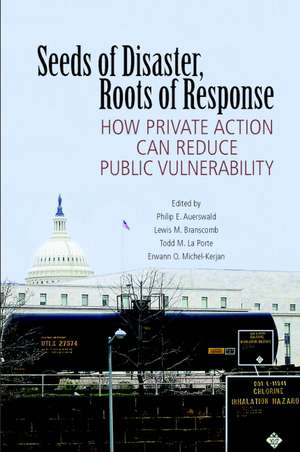Seeds of Disaster, Roots of Response: How Private Action Can Reduce Public Vulnerability
Editat de Philip E. Auerswald, Lewis M. Branscomb, Todd M. La Porte, Erwann O. Michel-Kerjanen Limba Engleză Hardback – 17 sep 2006
| Toate formatele și edițiile | Preț | Express |
|---|---|---|
| Paperback (1) | 432.86 lei 6-8 săpt. | |
| Cambridge University Press – 17 sep 2006 | 432.86 lei 6-8 săpt. | |
| Hardback (1) | 970.11 lei 6-8 săpt. | |
| Cambridge University Press – 17 sep 2006 | 970.11 lei 6-8 săpt. |
Preț: 970.11 lei
Preț vechi: 1128.03 lei
-14% Nou
Puncte Express: 1455
Preț estimativ în valută:
185.65€ • 193.58$ • 154.29£
185.65€ • 193.58$ • 154.29£
Carte tipărită la comandă
Livrare economică 20 martie-03 aprilie
Preluare comenzi: 021 569.72.76
Specificații
ISBN-13: 9780521857963
ISBN-10: 0521857961
Pagini: 576
Ilustrații: 40 tables
Dimensiuni: 164 x 242 x 30 mm
Greutate: 0.89 kg
Editura: Cambridge University Press
Colecția Cambridge University Press
Locul publicării:New York, United States
ISBN-10: 0521857961
Pagini: 576
Ilustrații: 40 tables
Dimensiuni: 164 x 242 x 30 mm
Greutate: 0.89 kg
Editura: Cambridge University Press
Colecția Cambridge University Press
Locul publicării:New York, United States
Cuprins
Foreword General Robert T. Marsh; Part I. Seeds of Disaster: 1. Where private efficiency meets public vulnerability: the critical infrastructure challenge Philip Auerswald, Lewis M. Branscomb, Todd M. La Porte and Erwann Michel-Kerjan; Part II. A Critical Challenge: 2. A nation forewarned: vulnerability of critical infrastructure in the twenty-first century Lewis M. Branscomb; 3. The brittle superpower Stephen E. Flynn; 4. Critical infrastructure protection in the United States since 1993 Brian Lopez; 5. Evolution of vulnerability assessment methods Brian Lopez; Part III. Managing Organizations: 6. Managing for the unexpected: reliability and organizational resilience Todd M. La Porte; 7. Notes toward a theory of the management of vulnerability Robert A. Frosch; 8. Challenges of assuring high reliability when facing suicidal terrorism Todd M. La Porte; 9. Managing for reliability in an age of terrorism Paul R. Schulman and Emery Roe; 10. Organizational strategies for complex system resilience, reliability, and adaptation Todd M. La Porte; Part IV. Securing Networks: 11. Complexity and interdependence: the unmanaged challenge Philip Auerswald; 12. Managing reliability in electric power companies Jack Feinstein; 13. Coordinated and uncoordinated crisis responses by the electric industry Michael Kormos and Thomas Bowe; 14. Electricity: protecting essential services Jay Apt, M. Granger Morgan and Lester B. Lave; 15. A cyber threat to national security? Sean P. Gorman; 16. Interdependent security in interconnected networks Geoffrey Heal, Michael Kearns, Paul Kleindorfer and Howard Kunreuther; Part V. Creating Markets: 17. Insurance, the 14th critical sector Erwann Michel-Kerjan; 18. Private risk management for terrorist attacks Lloyd Dixon and Robert Reville; 19. Terrorism, insurance, and preparedness: connecting the dots James W. Macdonald; 20. Looking beyond TRIA: a clinical examination of potential terrorism loss sharing Howard Kunreuther and Erwann Michel-Kerjan; 21. Financing catastrophe risk with public and private (re)insurance resources Franklin W. Nutter; Part VI. Building Trust: 22. Private-public collaboration on a national and international scale Lewis M. Branscomb and Erwann Michel-Kerjan; 23. Information sharing with the private sector: history, challenges, innovation, and prospects Daniel B. Prieto; 24. Sharing the watch: public-private collaboration for infrastructure security John D. Donahue and Richard J. Zeckhauser; 25. The Paris initiative, 'anthrax and beyond': transnational collaboration among interdependent critical networks Patrick Lagadec and Erwann Michel-Kerjan; Part VII. Roots of Response: 26. Leadership: who will act? Philip Auerswald, Lewis M. Branscomb, Todd M. La Porte and Erwann Michel-Kerjan.
Recenzii
'With 85% of America's critical infrastructure in private hands, the American people - and America's economy - are not going to be safe without strong, collaborative action by the public and private sector. Seeds of Disaster, Roots of Response is thus a timely and important volume that is a must-read for anyone concerned about our nation's security. ' Lee Hamilton, President, Woodrow Wilson International Center for Scholars and Vice Chair, 9/11 Commission
'Industries that provide critical infrastructure are becoming more efficient, but more vulnerable. This book introduces 'security externalities', a phenomenon that inhibits private investments that would make critical infrastructure services more resilient to potential disaster from any source. It calls not only for more leadership but for more realistic policies from both the private and the public sector. ' Prof. Thomas C. Schelling, Distinguished University Professor, University of Maryland and 2005 Nobel Prize Laureate in Economics
'This important book calls for a public-private national infrastructure protection plan to replace the current disorganized and dysfunctional response to catastrophic threats from terrorism, natural disasters and gargantuan operational errors. It asks the hard questions about how government and business can define and finance respective roles and stop the Alphonse and Gaston routine which makes disasters even more disastrous.' Ben W. Heineman, Jr, Senior Fellow at Harvard Law School and Harvard's Kennedy School of Government, Former Senior Vice President and General Counsel of GE
'Industries that provide critical infrastructure are becoming more efficient, but more vulnerable. This book introduces 'security externalities', a phenomenon that inhibits private investments that would make critical infrastructure services more resilient to potential disaster from any source. It calls not only for more leadership but for more realistic policies from both the private and the public sector. ' Prof. Thomas C. Schelling, Distinguished University Professor, University of Maryland and 2005 Nobel Prize Laureate in Economics
'This important book calls for a public-private national infrastructure protection plan to replace the current disorganized and dysfunctional response to catastrophic threats from terrorism, natural disasters and gargantuan operational errors. It asks the hard questions about how government and business can define and finance respective roles and stop the Alphonse and Gaston routine which makes disasters even more disastrous.' Ben W. Heineman, Jr, Senior Fellow at Harvard Law School and Harvard's Kennedy School of Government, Former Senior Vice President and General Counsel of GE
Descriere
Seeds of Disaster, Roots of Response is the first systematic attempt to understand how private decisions affect public vulnerability.












